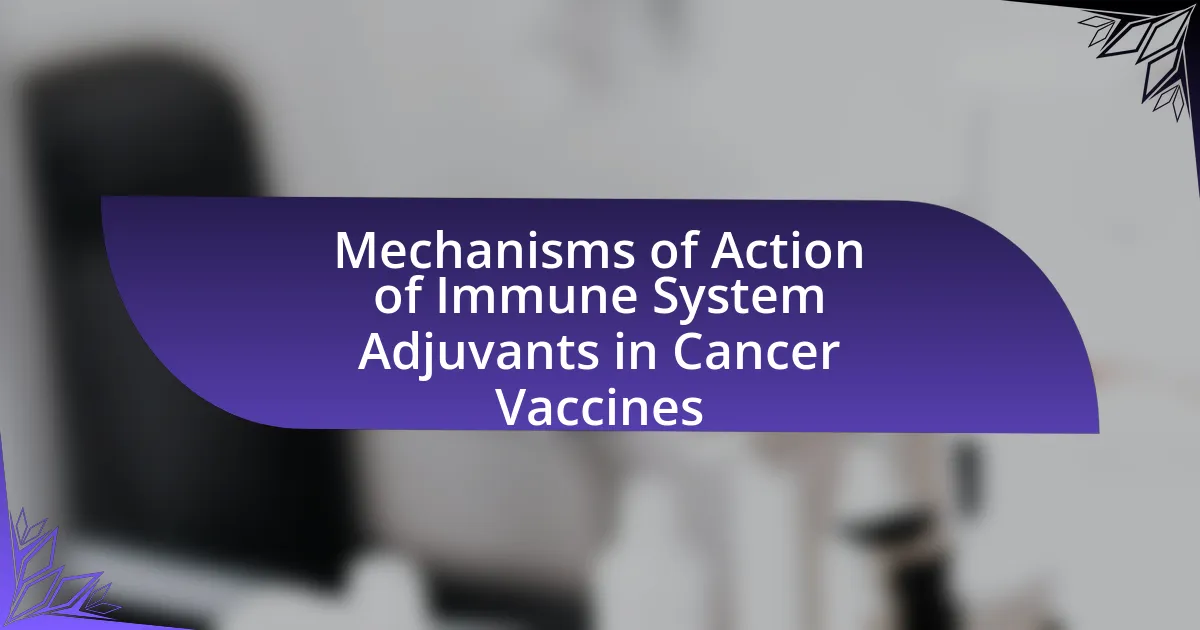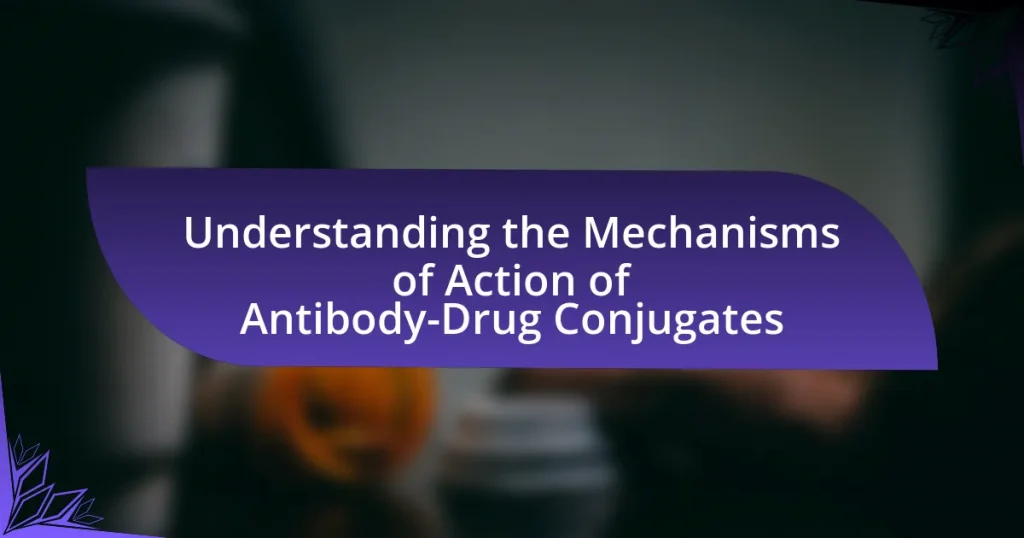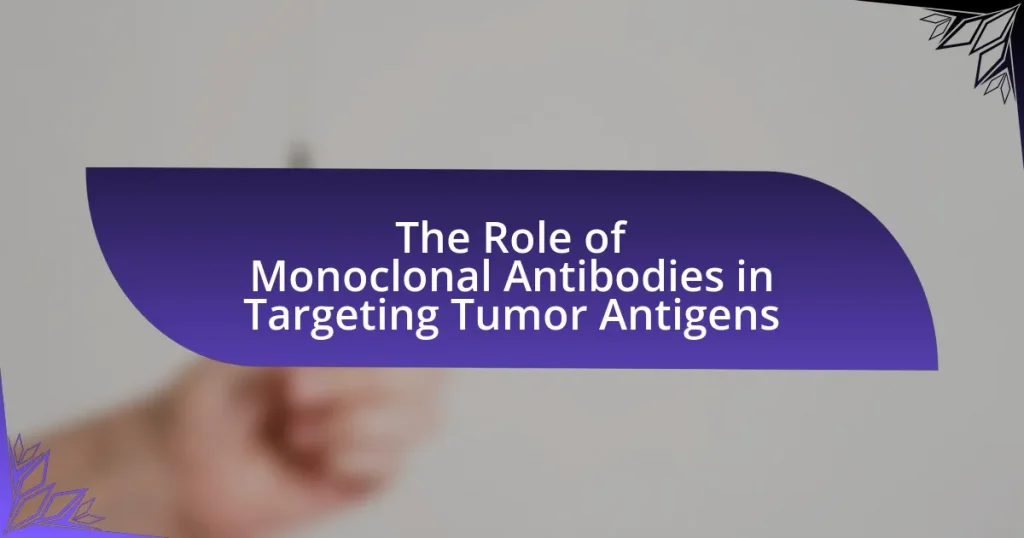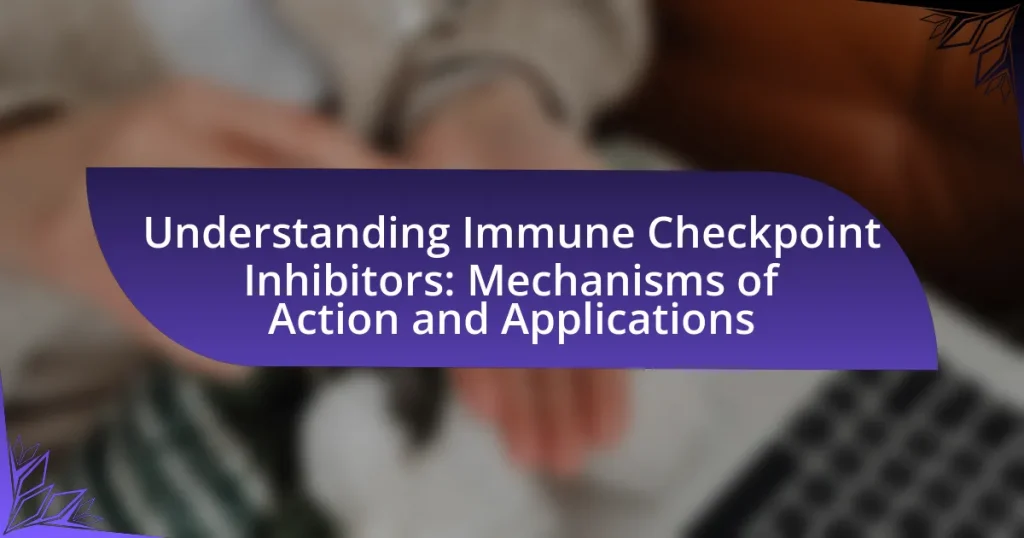Immune system adjuvants in cancer vaccines are critical components that enhance the body’s immune response to tumor antigens, thereby improving the efficacy of cancer immunotherapy. This article explores the mechanisms of action of various adjuvants, including Toll-like receptor agonists and cytokines, which stimulate innate immunity and promote T-cell activation. It also discusses the different types of adjuvants, their interactions with the immune system, and the clinical implications of their use in cancer vaccines. Additionally, the article addresses the challenges faced by cancer vaccines without adjuvants and outlines best practices for their application in therapeutic settings.
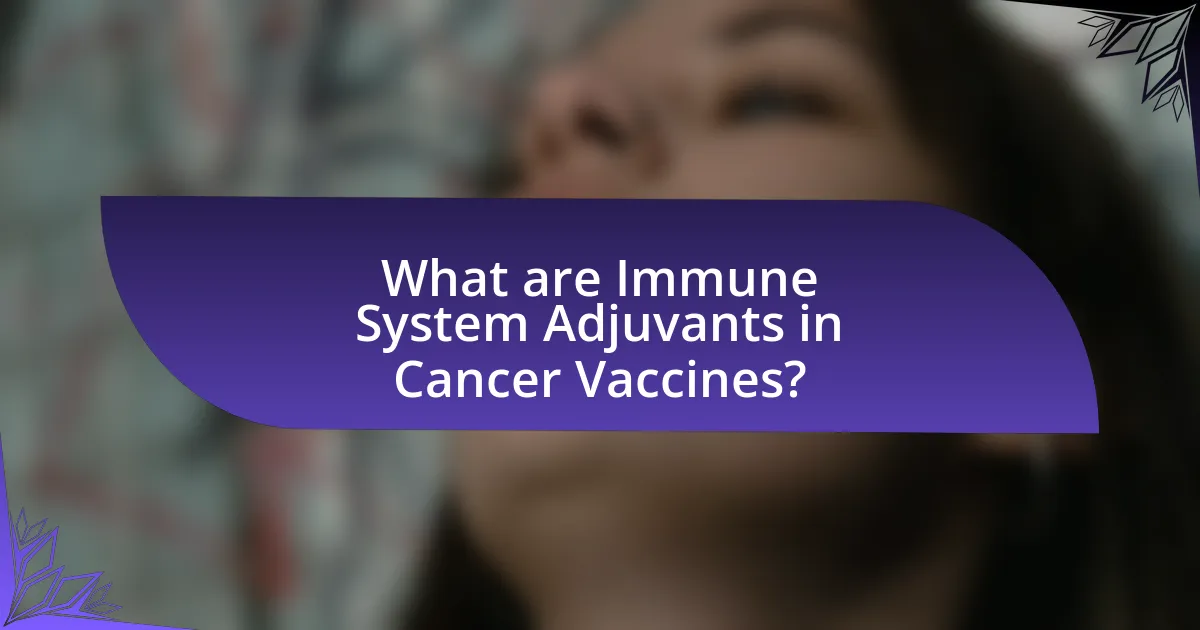
What are Immune System Adjuvants in Cancer Vaccines?
Immune system adjuvants in cancer vaccines are substances that enhance the body’s immune response to the vaccine. These adjuvants work by stimulating the immune system, promoting a stronger and more effective attack on cancer cells. For instance, adjuvants like CpG oligodeoxynucleotides and alum have been shown to activate dendritic cells and increase the production of cytokines, which are crucial for immune activation. Research indicates that the inclusion of adjuvants can significantly improve the efficacy of cancer vaccines, leading to better patient outcomes and prolonged survival rates.
How do immune system adjuvants enhance the effectiveness of cancer vaccines?
Immune system adjuvants enhance the effectiveness of cancer vaccines by stimulating a stronger and more prolonged immune response against tumor antigens. These adjuvants work by activating innate immune pathways, which leads to the recruitment and activation of various immune cells, such as dendritic cells and T cells. For instance, studies have shown that adjuvants like CpG oligodeoxynucleotides can increase the presentation of tumor antigens and promote the production of pro-inflammatory cytokines, thereby enhancing the adaptive immune response. This results in improved recognition and destruction of cancer cells, ultimately leading to better clinical outcomes in cancer immunotherapy.
What are the different types of immune system adjuvants used in cancer vaccines?
The different types of immune system adjuvants used in cancer vaccines include toll-like receptor (TLR) agonists, cytokines, and immune checkpoint inhibitors. TLR agonists, such as CpG oligodeoxynucleotides, enhance the immune response by activating innate immunity. Cytokines like interleukin-2 (IL-2) and granulocyte-macrophage colony-stimulating factor (GM-CSF) promote the proliferation and activation of immune cells. Immune checkpoint inhibitors, such as anti-PD-1 and anti-CTLA-4 antibodies, block inhibitory pathways in T cells, thereby enhancing their ability to attack cancer cells. These adjuvants have been shown to improve the efficacy of cancer vaccines by stimulating a more robust and sustained immune response against tumors.
How do these adjuvants interact with the immune system?
Adjuvants enhance the immune response by interacting with various components of the immune system, primarily through the activation of antigen-presenting cells (APCs) such as dendritic cells. These interactions lead to increased production of cytokines and chemokines, which promote T cell activation and proliferation. For example, studies have shown that adjuvants like MPLA (monophosphoryl lipid A) stimulate Toll-like receptors (TLRs) on APCs, resulting in a robust immune response characterized by the activation of both innate and adaptive immunity. This mechanism is crucial for improving the efficacy of cancer vaccines, as it helps to generate a stronger and more specific immune response against tumor antigens.
Why are immune system adjuvants critical in cancer immunotherapy?
Immune system adjuvants are critical in cancer immunotherapy because they enhance the immune response against tumors. These adjuvants work by stimulating immune cells, such as dendritic cells, to present tumor antigens more effectively, thereby increasing the activation of T cells that target cancer cells. For instance, studies have shown that the use of adjuvants like CpG oligodeoxynucleotides can significantly improve the efficacy of cancer vaccines by promoting a stronger and more durable immune response. This enhanced immune activation is essential for overcoming the immunosuppressive tumor microenvironment, ultimately leading to better clinical outcomes in cancer treatment.
What challenges do cancer vaccines face without adjuvants?
Cancer vaccines face significant challenges without adjuvants, primarily due to inadequate immune response activation. Adjuvants are crucial for enhancing the immunogenicity of cancer vaccines, as they stimulate the immune system to recognize and attack cancer cells more effectively. Without adjuvants, cancer vaccines often fail to elicit a robust T-cell response, leading to insufficient tumor-specific immunity. Studies have shown that vaccines lacking adjuvants may result in lower antibody production and reduced activation of dendritic cells, which are essential for initiating immune responses. Consequently, the absence of adjuvants can lead to diminished therapeutic efficacy and poor patient outcomes in cancer immunotherapy.
How do adjuvants improve the immune response to cancer antigens?
Adjuvants improve the immune response to cancer antigens by enhancing the activation and proliferation of immune cells, particularly T cells and dendritic cells. They achieve this by providing additional signals that stimulate the immune system, which can lead to a more robust and sustained immune response against cancer cells. For instance, studies have shown that adjuvants like CpG oligodeoxynucleotides can increase the expression of co-stimulatory molecules on dendritic cells, thereby promoting T cell activation and improving the recognition of cancer antigens. This mechanism has been validated in clinical settings, where the inclusion of adjuvants in cancer vaccines has resulted in higher rates of tumor regression and improved patient outcomes.

What are the Mechanisms of Action of Immune System Adjuvants?
Immune system adjuvants enhance the body’s immune response to antigens through several mechanisms. These mechanisms include the activation of innate immune cells, such as dendritic cells and macrophages, which promote antigen presentation and stimulate T-cell activation. Additionally, adjuvants can induce the release of pro-inflammatory cytokines, which further amplify the immune response. For example, studies have shown that the use of adjuvants like MPLA (monophosphoryl lipid A) can significantly increase the production of interleukin-12, a cytokine crucial for T-cell differentiation. Furthermore, some adjuvants can create a depot effect, prolonging antigen exposure and enhancing the likelihood of a robust immune response. These mechanisms collectively contribute to the efficacy of cancer vaccines by improving the recognition and targeting of tumor antigens by the immune system.
How do adjuvants activate innate immunity?
Adjuvants activate innate immunity by enhancing the immune response through the stimulation of pattern recognition receptors (PRRs) such as Toll-like receptors (TLRs). These receptors recognize pathogen-associated molecular patterns (PAMPs) and damage-associated molecular patterns (DAMPs), leading to the activation of innate immune cells like dendritic cells and macrophages. This activation results in the production of pro-inflammatory cytokines and chemokines, which promote the recruitment and activation of adaptive immune cells, thereby amplifying the overall immune response. Studies have shown that adjuvants like MPLA (monophosphoryl lipid A) and alum can significantly increase the expression of co-stimulatory molecules on antigen-presenting cells, further enhancing T cell activation and promoting a robust immune response against tumors.
What role do pattern recognition receptors play in adjuvant action?
Pattern recognition receptors (PRRs) play a crucial role in adjuvant action by recognizing pathogen-associated molecular patterns (PAMPs) and danger-associated molecular patterns (DAMPs), which activate innate immune responses. This activation enhances the adaptive immune response, leading to improved efficacy of cancer vaccines. PRRs, such as Toll-like receptors (TLRs), trigger signaling pathways that promote the maturation of dendritic cells and the production of pro-inflammatory cytokines, thereby facilitating T cell activation and proliferation. Studies have shown that the engagement of PRRs by adjuvants can significantly increase the immunogenicity of cancer vaccines, leading to stronger and more durable anti-tumor responses.
How do adjuvants influence dendritic cell maturation?
Adjuvants influence dendritic cell maturation by enhancing their ability to process and present antigens, thereby promoting a stronger immune response. They achieve this by activating various signaling pathways, such as the Toll-like receptor (TLR) pathways, which lead to the upregulation of co-stimulatory molecules and cytokines essential for dendritic cell maturation. For instance, studies have shown that adjuvants like MPLA (monophosphoryl lipid A) can significantly increase the expression of CD80 and CD86 on dendritic cells, which are critical for T cell activation. This process is vital in cancer vaccines, as mature dendritic cells are more effective in stimulating T cells to recognize and attack tumor cells.
What is the role of adjuvants in promoting adaptive immunity?
Adjuvants play a crucial role in promoting adaptive immunity by enhancing the immune response to antigens. They achieve this by stimulating innate immune pathways, which in turn activate T cells and B cells, leading to a more robust and long-lasting adaptive immune response. For instance, studies have shown that adjuvants like alum and MPL (monophosphoryl lipid A) can significantly increase the production of antibodies and the activation of T helper cells, thereby improving the efficacy of vaccines. This enhancement is vital in cancer vaccines, where a strong adaptive immune response is necessary to target and eliminate tumor cells effectively.
How do adjuvants enhance T-cell activation and proliferation?
Adjuvants enhance T-cell activation and proliferation by providing additional signals that stimulate the immune response. These substances, often included in vaccines, activate pattern recognition receptors (PRRs) on antigen-presenting cells (APCs), leading to increased expression of co-stimulatory molecules and cytokines. For instance, adjuvants like MPLA (monophosphoryl lipid A) can trigger Toll-like receptor 4 (TLR4), resulting in the upregulation of CD80/CD86 on APCs, which is crucial for effective T-cell activation. This process not only promotes the differentiation of naïve T-cells into effector T-cells but also enhances their proliferation, thereby increasing the overall immune response against cancer cells.
What mechanisms do adjuvants use to stimulate B-cell responses?
Adjuvants stimulate B-cell responses primarily through enhancing antigen presentation and activating innate immune pathways. They achieve this by promoting the uptake of antigens by antigen-presenting cells (APCs), which then present these antigens to B-cells, leading to their activation and proliferation. Additionally, adjuvants can induce the release of cytokines and chemokines that further support B-cell differentiation and antibody production. For instance, studies have shown that adjuvants like alum and MPL (monophosphoryl lipid A) can significantly increase the production of specific antibodies in response to vaccines, demonstrating their effectiveness in enhancing B-cell responses.

What are the Clinical Implications of Using Adjuvants in Cancer Vaccines?
The clinical implications of using adjuvants in cancer vaccines include enhanced immune response, improved efficacy, and potential for better patient outcomes. Adjuvants stimulate the immune system, leading to a stronger and more sustained activation of T cells and antibodies against cancer cells. For instance, studies have shown that the inclusion of adjuvants can increase the overall survival rates in patients with melanoma when combined with specific vaccines. Additionally, adjuvants can help in overcoming tumor-induced immunosuppression, thereby allowing for a more effective attack on tumors. This is supported by clinical trials demonstrating that adjuvants like CpG oligodeoxynucleotides and MPLA have significantly improved the immunogenicity of cancer vaccines, leading to better therapeutic responses.
How do adjuvants affect the safety and efficacy of cancer vaccines?
Adjuvants enhance the safety and efficacy of cancer vaccines by improving immune responses and reducing adverse effects. They achieve this by stimulating the immune system, leading to a stronger and more durable response against cancer cells. For instance, studies have shown that the inclusion of adjuvants like CpG oligodeoxynucleotides can significantly increase the production of specific antibodies and T-cell responses, which are crucial for effective cancer immunotherapy. Additionally, adjuvants can help mitigate the risk of immune tolerance, ensuring that the immune system remains responsive to tumor antigens. This dual role of enhancing efficacy while maintaining safety underscores the importance of adjuvants in the development of effective cancer vaccines.
What are the potential side effects associated with adjuvants?
Adjuvants can cause a range of potential side effects, including local reactions such as pain, swelling, and redness at the injection site, as well as systemic effects like fever, fatigue, and malaise. These side effects occur due to the immune system’s heightened response to the adjuvant, which is designed to enhance the effectiveness of the vaccine. Studies have shown that while most side effects are mild and transient, some adjuvants can lead to more severe reactions, such as allergic responses or autoimmune conditions, although these are rare. For instance, the use of certain adjuvants like AS03 has been associated with increased reports of adverse events, highlighting the importance of monitoring and understanding the safety profiles of these immune enhancers in cancer vaccine applications.
How do clinical trials assess the effectiveness of adjuvants in cancer vaccines?
Clinical trials assess the effectiveness of adjuvants in cancer vaccines by comparing the immune responses and clinical outcomes of patients receiving the vaccine with adjuvant to those receiving the vaccine without adjuvant. These trials typically measure endpoints such as tumor response rates, overall survival, and specific immune markers, such as antibody levels and T-cell activation, to determine the adjuvant’s impact on enhancing the vaccine’s efficacy. For instance, a study published in the Journal of Clinical Oncology demonstrated that the addition of an adjuvant significantly increased the overall survival rate in patients with melanoma, providing concrete evidence of the adjuvant’s effectiveness in improving vaccine outcomes.
What future directions exist for research on adjuvants in cancer vaccines?
Future directions for research on adjuvants in cancer vaccines include the exploration of novel adjuvant formulations, the identification of specific immune pathways they activate, and the integration of personalized medicine approaches. Researchers are focusing on combining adjuvants with existing therapies to enhance immune responses, as evidenced by studies showing that certain adjuvants can significantly improve the efficacy of cancer vaccines in preclinical models. Additionally, ongoing investigations aim to understand the mechanisms by which adjuvants modulate the tumor microenvironment, which is crucial for developing more effective cancer immunotherapies.
How can novel adjuvants improve cancer vaccine strategies?
Novel adjuvants can enhance cancer vaccine strategies by improving immune responses and increasing the efficacy of the vaccines. These adjuvants work by stimulating the immune system to recognize and attack cancer cells more effectively, often by promoting the activation of dendritic cells and enhancing T-cell responses. For instance, research has shown that adjuvants like Toll-like receptor agonists can significantly boost the activation of antigen-presenting cells, leading to a stronger and more durable immune response against tumors. Additionally, novel adjuvants can help tailor immune responses to specific cancer types, thereby increasing the precision and effectiveness of cancer immunotherapy.
What are the emerging trends in adjuvant development for cancer immunotherapy?
Emerging trends in adjuvant development for cancer immunotherapy include the use of combination therapies, personalized adjuvants, and the incorporation of novel delivery systems. Combination therapies, such as pairing immune checkpoint inhibitors with adjuvants, have shown enhanced efficacy in activating immune responses against tumors. Personalized adjuvants, tailored to individual patient profiles and tumor characteristics, aim to optimize immune activation and improve therapeutic outcomes. Additionally, novel delivery systems, including nanoparticles and microneedles, are being explored to enhance the stability and targeted delivery of adjuvants, thereby increasing their effectiveness in stimulating the immune system. These trends are supported by ongoing clinical trials and research demonstrating improved patient responses and survival rates when utilizing these innovative approaches in cancer immunotherapy.
What best practices should be followed when using adjuvants in cancer vaccines?
Best practices when using adjuvants in cancer vaccines include selecting appropriate adjuvants based on their mechanism of action, optimizing dosing regimens, and conducting thorough preclinical and clinical evaluations. The choice of adjuvant should align with the specific immune response desired, such as enhancing T-cell activation or promoting antibody production. For instance, the use of Toll-like receptor (TLR) agonists can effectively stimulate innate immunity, leading to a stronger adaptive response. Additionally, dosing regimens must be carefully optimized to balance efficacy and safety, as excessive doses may lead to adverse effects. Comprehensive evaluations in preclinical models, followed by phased clinical trials, ensure that the adjuvant’s safety and effectiveness are rigorously assessed, as demonstrated in studies like the one by Melief et al. (2015) in “Nature Reviews Cancer,” which highlights the importance of these practices in developing effective cancer vaccines.
